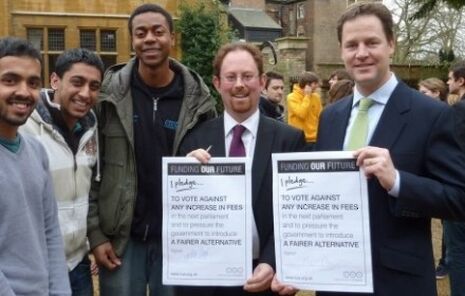Clegg slams Cambridge fee decision
Deputy PM says Oxbridge plans to charge maximum tuition fees is “not up to them”

Nick Clegg has criticised Cambridge and Oxford for considering tuition fees of £9,000, stating that the decision ‘is not up to them’.
Mr Clegg’s comments came after an internal University document revealed on Tuesday that the University is planning to charge the maximum fees allowed under the government’s new higher education proposals.
The document makes a number of recommendations to the University Council on fees, bursaries and widening participation. Its main point is that a flat-rate fee of £9,000 should be charged to all UK and EU students irrespective of course or college.
One section of the report says, "The level of tuition fee charged from 2012 entry should be the maximum permissible, i.e. £9,000 pa with any subsequent adjustment for inflationary increases."
Academics at the University of Oxford convened on Tuesday to consider the same issue; it seems likely they will also look to charge the maximum fees permissible.
Reacting to Mr Clegg’s comments, Edward Couzens, an undergraduate of Downing College, told Varsity, "Nick Clegg’s naivety appears to know no bounds.
Given the spending cuts to higher education, how can the University of Cambridge expect to maintain its academic reputation without charging the maximum fees?"
A University spokesperson refused to comment on Mr Clegg’s statement, saying that they were "waiting for the University Council to consider the working group’s proposals."
However, a section of the working group paper says, "To charge less than £9,000 might raise questions about our commitment to excellence since a reduced fee in the long term could only be sustained by reducing costs and hence quality."
The comments were made in a BBC debate between students and the Deputy Prime Minister. One of the students said to Mr Clegg, "You are either stupid, or you are mad, or you are malicious."
In the debate, Clegg stated that Cambridge and Oxford would only be able to charge fees of £9,000 if they "dramatically increase" access for students from deprived backgrounds.
Universities also face fines of up to £0.5m from the government if they fail to meet such access targets.
The Cambridge working group paper does show, however, that the University will be making an active attempt to support those students from poorer backgrounds.
One proposal states that students whose family income is less than £25,000 will only be applicable for tuition fees of £6,000. In addition, a bursary of £1,625 will be offered to students whose parents earn less than £25,000. This bursary falls to zero once family income rises over £42,000.
The report also recommends that the University should attempt to increase the proportion of students from state schools to between 61-63% from its current level of 58%.
CUSU president Rahul Mansigani commented, "Cambridge offers a fantastic educational experience: with a tripling of the standard fee to £9000, the need for proactive Access work from the University is more important than ever."
Preservation of ‘proactive’ accessmay be an issue given that the current cash bursary of £3,400 is being cut to £1,625 under the new proposals. The fee waiver of £3,000 does however make up for the fall in the cash bursary.
The University is said to be limiting use of the maintenance bursary due to a "shortfall between costs and income".
All universities in England and Wales must send proposals for fees, financial support for students and access provisions to OFFA by 31st March. A final decision is expected from Cambridge in the coming weeks.
 News / Police to stop searching for stolen Fitzwilliam jade17 April 2024
News / Police to stop searching for stolen Fitzwilliam jade17 April 2024 News / Copycat don caught again19 April 2024
News / Copycat don caught again19 April 2024 Interviews / ‘It fills you with a sense of awe’: the year abroad experience17 April 2024
Interviews / ‘It fills you with a sense of awe’: the year abroad experience17 April 2024 News / Night Climbers call for Cambridge to cut ties with Israel in new stunt15 April 2024
News / Night Climbers call for Cambridge to cut ties with Israel in new stunt15 April 2024 News / Acting vice-chancellor paid £234,000 for nine month stint19 April 2024
News / Acting vice-chancellor paid £234,000 for nine month stint19 April 2024




